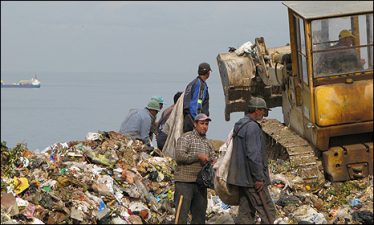![ice_breaks_10[1]](https://www.greenprophet.com/wp-content/uploads/2009/12/ice_breaks_101-500x330.jpg) The glaciers are melting – and seas are rising – is climate change to blame?
The glaciers are melting – and seas are rising – is climate change to blame?
It’s over: the two week long COP 15 conference on global warming and climate change ended Friday night with a weak agreement to try to keep global warming temperature levels at or below 2 degrees Celsius, and to allocate a sum of $ 30 billion towards dealing with the effects of climate change by the year 2012.
The hastily hammered out deal also calls for a measure of transparency to be established between developed and developing nations towards dealing with the consequences of global warming and climate change.
While not perfect by any means, the agreement, signed by leaders of the U.S., Brazil, India, South Africa, and China, was perhaps better than nothing, and at least kept the conference from ending in failure; with nothing more than photo shots of the participants, along with video clips of the outside “street participants” in running battles with Danish police and with scores of them being arrested and detained until the conference’s end.The deal, in which U.S. President Barack Obama said “all major economies have come together to accept their responsibilities to combat climate change” is at least a start, even though disappointed environmentalists had hoped for much stronger measures to reduce the carbon footprint effects of both the developed and developing nations on our planet’s nvironment. And many protesting “street environmists” paid the price for their concern by becoming “guests” of the Copenhagen Police Department.
President Obama showed up on the last day of the conference like a knight in shining armor, and was shuttled from meeting to meeting in order to confer with as many delegates as possible, as well as have some private talks on other international matters with leaders of Russia, China (whose premier Wen Jiobao actually stood him up) and others before the President was finally able to attend a meeting with the other four major signers in order to finalize the agreement.
Ireland’s Prime Minister, Brian Cowen, described the deal agreed so far by 28 world leaders at the Copenhagen climate change summit as “far less ambitious than what we wanted.”
The agreement is not legally binding, however, as it has to be endorsed by all of the 193 countries who participated at the conference; many of them being developing nations, who feel that they are being blamed more for their impact on global warming due to their “slash and burn” agriculture, depletion of tropical rain forests, and use of coal and other highly polluting fossil fuels for power and manufacturing industries. Many developing country leaders lambasted the agreement, including Sudan’s UN Ambassador Lumumba Stanislaus Di-Aping, who said the agreement was “just an idea.”
Although Sudan is not exactly a good example of Middle Eastern countries sensitive to the effects of climate change, other countries in this region are also not too pleased with having the larger more developed countries dictate terms to them regarding their responsibility in combating global warming.
But it must be noted that although the entire Middle is responsible for less than 5 percent of the world’s total emissions and pollution that contribute to global warming, the region does account for nearly 50% of world petroleum production that is considered a major cause of global warming. Israel and Egypt are reported to have the largest amount of carbon emissions, with those like Jordan and Lebanon having lesser amounts.
Despite the contribution of Middle Eastern countries towards the fossil fuels that are said by many to be causing much of our current global warming woes, a number of these countries are currently involved in solar energy and other renewable energy projects; including those in the Persian Gulf region, Egypt, and Israel.
While Israel has some of the most developed solar energy projects in the world, it also is responsible for the second highest level of carbon emissions, coming in after Egypt. Israel is also in danger of having its local solar energy projects curtailed significantly due to a recent announcement by the Israel Electric Corporation that it no longer has funds to subsidize the purchase of excess electricity sold back to the country’s national electricity grid by solar powered electricity plants.
Whether similar situations could happen in other Middle East countries remains to be seen. But in any event, and for the present time anyway, the outcome of the two week conference in Copenhagen, will not result in many earthshaking changes in a part of the world that still supplies the world with nearly 50% of it’s petroleum – with all its implications.
Photos via Paul Souders/Corbis, cnn.com





i would like to know about the picture of the glazier if that is okay
if it is possible you could tell me
– the name of photographer
– Title of the picture
– When and where abouts is this photo taken
that would be great if you could do that for me, as i am using it in a school assignment and i will make sure i refer it to your website.
Thanks
well it is easy to blame 'less developed' countries for wasting more. only problem seams to be that we dont pay attention to WHAT we are using resources for. sorry but i cant see it as equal as that if person in poor countries trying to get daily food the uses machines that create same amount of waist as people in usa cos they feel that having public transport is only for poor people and they need to have two cars in family. i know there is no difference when it comes to ice melting etc but as human race there is a difference.
well it is easy to blame 'less developed' countries for wasting more. only problem seams to be that we dont pay attention to WHAT we are using resources for. sorry but i can see it as equal as that if person in poor countries trying to get daily food for the uses machines that create same amount of waist as people in usa cos they feel that having public transport is only for poor people and they need to have two cars in family. i know there is no difference when it comes to ice melting etc but as human race there is a difference.
I think with so many government officials in one room it would be near impossible to stamp out an agreement. What Copenhagen did is rally together a critical mass of people from all over the world who will apply their vision and power to their work as activists back home. Copenhagen got more press attention than any other environment story in such a short time. Now is the time for action, and I believe it will happen.
Early on when the climate change discussions started, some adventurous public relations activity successfully branded this as a “save the environment – save earth” campaign. It is certainly not one. Were the discussions in Copenhagen aimed at saving the environment “for and in itself “or saving the environment as a means to save the human race?In the millions of years that our planet has existed, it has seen many changes to its climate. These changes have inevitably resulted extinction of certain species and permitting others to grow, prosper and dominate the planet. Some view that humans came to dominate earth only as a consequence of dinosaur’s extinction, which in itself was a result of a massive climate change owing to an asteroid collision.Life on earth will continue even if there is a radical change to earth’s climate, may be our species will diminish or fade away and others will emerge and dominate. It is important to view the climate change discussions in this light, “to save the human dominance of earth”Many say that we have no scientific basis and others say “is science the epitome of all knowledge we have ever had?” Again no definite answers, only opinions some backed by maths and physics and some feel and belief, which is better of the two?? Is our maths and science not another approximation of reality at best, remember Newton’s gravity theory which no longer has any relevance post general relativity! I am sure we will have more opinions on this too. Our cumulative knowledge on this subject is thus effectively limited by our imagination at best.
Coming back to climate change, early on when the climate change discussions started, some adventurous public relations activity successfully branded this as a “save the environment – save earth” campaign. It is certainly not one. Were the discussions in Copenhagen aimed at saving the environment “for and in itself “or saving the environment as a means to save the human race?In the millions of years that our planet has existed, it has seen many changes to its climate. These changes have inevitably resulted extinction of certain species and permitting others to grow, prosper and dominate the planet. Some view that humans came to dominate earth only as a consequence of dinosaur’s extinction, which in itself was a result of a massive climate change owing to an asteroid collision.Life on earth will continue even if there is a radical change to earth’s climate, may be our species will diminish or fade away and others will emerge and dominate. It is important to view the climate change discussions in this light, “to save the human dominance of earth”Many say that we have no scientific basis and others say “is science the epitome of all knowledge we have ever had?” Again no definite answers, only opinions some backed by maths and physics and some feel and belief, which is better of the two?? Is our maths and science not another approximation of reality at best, remember Newton’s gravity theory which no longer has any relevance post general relativity! I am sure we will have more opinions on this too. Our cumulative knowledge on this subject is thus effectively limited by our imagination at best.
As long as we let big corporations dictate what comes out of international negotiations, the result will never be one that suits the needs of citizens. We need to reclaim power and democratize the world, that's why the protests for climate justice were so important.http://cooltheearth.wordpress.com/